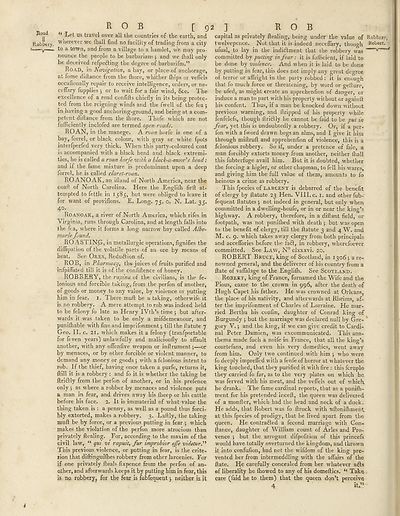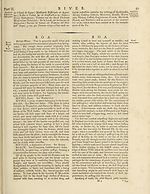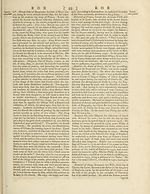Encyclopaedia Britannica, or, a Dictionary of arts, sciences, and miscellaneous literature : enlarged and improved. Illustrated with nearly six hundred engravings > Volume 18, RHI-SCR
(100) Page 92
Download files
Complete book:
Individual page:
Thumbnail gallery: Grid view | List view

Jlyad
II
R^obbery.
ROB [9
“ Let us travel over all the countries of the earth, and
wherever we fhall find no facility of trading from a city
to a town, and from a village to a hamlet, we may pro¬
nounce the people to be barbarians j and we fhall only
be deceived refpefting the degree of barbanfm.”
Road, in Navigation, a bay, or place of anchorage,
at fome diftance from the fiiore, whither (hips or vefiels
occafionally repair to receive intelligence, orders, or ne-
ceflary tupplies ; or to wait for a fair wind, &c. The
excellence of a road confifis chiefly in its being protec¬
ted from the reigning winds and the fwell of the fea ;
in having a good anchoring-ground, and being at a com¬
petent diftance from the fhore. Thofe which are not
fufficiently inclofed are termed open roads.
ROAN, in the manege. A roan horfe is one of a
bay, forrel, or black colour, with gray or white fpots
interfperfed very thick. When this party-coloured coat
is accompanied with a black head and black extremi¬
ties, he is called a roan horfe with a black-a-moor's head:
and if the fame mixture is predominant upon a deep
forrel, he is called claret-roan.
ROANOAK , an ifiand of North America, near the
coaft of North Carolina. Here the Englifh firft at¬
tempted to fettle in 1585, but were obliged to leave it
for want of provifions. E. Long. 75. o. N. Lat. 35.
4°’
Roanoak, a river of North America, which rifes in
Virginia, runs through Carolina, and at length falls into
the fea, where it forms a long narrow bay called Albe¬
marle fund.
ROASTING, in metallurgic operations, fignifies the
diffipation of the volatile parts of an ore by means of
heat. See Ores, Reduction of.
ROB, in Pharmacy, the juices of fruits purified and
infpiifated till it is of the confiffence of honey.
ROBBERY, the rapinu of the civilians, is the fe¬
lonious and forcible taking, from the perfon of another,
of goods or money to any value, by violence or putting
him in fear. 1. There muft be a taking, otherwife it
is no robbery. A mere attempt to rob was indeed held
to be felony fo late as Henry IVth’s time 5 but after¬
wards it was taken to be only a mifdemeanour, and
punilhable with fine and imprifonment; till the flatute 7
Geo. II. c. 21. which makes it a felony (tranfportable
for feven years) unlawfully and malicioufly to affault
another, with any offenfive weapon or inftrument;—or
by menaces, or by other forcible or violent manner, to
demand any money or goods •, with a felonious intent to
rob. If the thief, having once taken a purfe, returns it,
flill it is a robbery : and fo it is whether the taking be
ftriffly from the perfon of another, or in his prefence
only ; as where a robber by menaces and violence puts
a man in fear, and drives away his (beep or his cattle
before his face. 2. It is immaterial of what value the
thing taken is : a penny, as well as a pound thus forci¬
bly extorted, makes a robbery. 3. Laftly, the taking
muft be by force, or a previous putting in fear •, which
makes the violation of the perfon more atrocious than
privately Healing. For, according to the maxim of the
civil law, “ qui vi rapuit, fur improbior ejfe videturN
This previous violence, or putting in fear, is the crite¬
rion that diftinguifties robbery from other larcenies. For
if one privately fteals fixpence from the perfon of an¬
other, and afterwards keeps it by putting him in fear, this
is no robbery, for the fear is fubfequent j neither is. it
2 ] ROB
capital as privately ftealing, being under the value of Robberv,
twelvepence. Not that it is indeed neceflary, though
ufual, to lay in the indi&ment that the robbery w^as v ^
committed by putting in fear: it is fufficient, if laid to
be done by violence. And when it is laid to be done
by putting in fear, this does not imply any great degree
of terror or affright in the party robbed : it is enough
that fo much force or threatening, by word or gefture,
be ufed, as might create an apprehenfion of danger, or
induce a man to part with his property without or againft
his confent. Thus, if a man be knocked down without
previous warning, and firipped of his property while
fenfelefs, though ftridlly he cannot be faid to be put in
fear, yet this is undoubtedly a robbery. Or, if a per¬
fon with a fword drawn begs an alms, and I give it him
through miftruft and apprehenfion of violence, this is a
felonious robbery. So if, under a pretence of fale, a
man forcibly extorts money from another, neither (hall
this fubterfuge avail him. But it is doubted, whether
the forcing a higler, or other chapman, to fell his wares,
and giving him the full value of them, amounts to fo
heinous a crime as robbery.
This fpecies of larceny is debarred of the benefit
of clergy by ftatute 23 Hen. VIII. c. 1. and other fub¬
fequent ftatutes ; not indeed in general, but only when
committed in a dwelling-houfe, or in or near the king’s
highway. A robbery, therefore, in a diftant field, or
footpath, was not punilhed with death ; but was open
to the benefit of clergy, till the ftatute 3 and 4 W. and
M. c. 9. which takes away clergy from both principals
and acceffories before the fa£l, in robbery, wherefoever
committed. See Law, N° clxxxvi. 20.
ROBERT Bruce, king of Scotland, in 1306 ; a re¬
nowned general, and the deliverer of his country from a
ftate of vaffalage to the Englifh. See Scotland.
Robert, king of France, furnamed the Wife and the
Pious, came to the crown in 996, after the death of
Hugh Capet his father. He was crowned at Orleans,
the place of his nativity, and afterwards at Rheims, af¬
ter the imprifonment of Charles of Lorraine. He mar¬
ried Bertha his coufin, daughter of Conrad king of
Burgundy j but the marriage was declared null by Gre¬
gory V.; and the king, if we can give credit to Cardi¬
nal Peter Damien, was excommunicated. This ana¬
thema made fuch a noife in France, that all the king’s
courtefans, and even his very domeftics, went away
from him. Only two continued with him ; who Avere
fo deeply impreffed with a fenfe of horror at whatever the
king touched, that they purified it with fire : this fcruple
they carried fo far, as to the very plates on which he
was ferved with his meat, and the veffels out of which,
he drank. The fame cardinal reports, that as a punilh-
ment for his pretended inceft, the queen was delivered
of a monfler, which had the head and neck of a duck.
He adds, that Robert was fo ftruck with ■aftoniftiment.
at this fpecies of prodigy, that he lived apart from the
queen.
He contra61ed a fecond marriage with Con-
ftance, daughter of William count of Arles and Pro¬
vence ; but the arrogant difpofition of this princefs
would have totally overturned the kingdom, and thrown
it into confufion, had not the wifdom of the king pre¬
vented her from intermeddling with the affairs of the
ftate. H|e carefully concealed from her whatever a£fs
of liberality he ftiowed to any of his domeftics. “ Take
care (faid he to them) that the queen don’t perceive
4 it”
II
R^obbery.
ROB [9
“ Let us travel over all the countries of the earth, and
wherever we fhall find no facility of trading from a city
to a town, and from a village to a hamlet, we may pro¬
nounce the people to be barbarians j and we fhall only
be deceived refpefting the degree of barbanfm.”
Road, in Navigation, a bay, or place of anchorage,
at fome diftance from the fiiore, whither (hips or vefiels
occafionally repair to receive intelligence, orders, or ne-
ceflary tupplies ; or to wait for a fair wind, &c. The
excellence of a road confifis chiefly in its being protec¬
ted from the reigning winds and the fwell of the fea ;
in having a good anchoring-ground, and being at a com¬
petent diftance from the fhore. Thofe which are not
fufficiently inclofed are termed open roads.
ROAN, in the manege. A roan horfe is one of a
bay, forrel, or black colour, with gray or white fpots
interfperfed very thick. When this party-coloured coat
is accompanied with a black head and black extremi¬
ties, he is called a roan horfe with a black-a-moor's head:
and if the fame mixture is predominant upon a deep
forrel, he is called claret-roan.
ROANOAK , an ifiand of North America, near the
coaft of North Carolina. Here the Englifh firft at¬
tempted to fettle in 1585, but were obliged to leave it
for want of provifions. E. Long. 75. o. N. Lat. 35.
4°’
Roanoak, a river of North America, which rifes in
Virginia, runs through Carolina, and at length falls into
the fea, where it forms a long narrow bay called Albe¬
marle fund.
ROASTING, in metallurgic operations, fignifies the
diffipation of the volatile parts of an ore by means of
heat. See Ores, Reduction of.
ROB, in Pharmacy, the juices of fruits purified and
infpiifated till it is of the confiffence of honey.
ROBBERY, the rapinu of the civilians, is the fe¬
lonious and forcible taking, from the perfon of another,
of goods or money to any value, by violence or putting
him in fear. 1. There muft be a taking, otherwife it
is no robbery. A mere attempt to rob was indeed held
to be felony fo late as Henry IVth’s time 5 but after¬
wards it was taken to be only a mifdemeanour, and
punilhable with fine and imprifonment; till the flatute 7
Geo. II. c. 21. which makes it a felony (tranfportable
for feven years) unlawfully and malicioufly to affault
another, with any offenfive weapon or inftrument;—or
by menaces, or by other forcible or violent manner, to
demand any money or goods •, with a felonious intent to
rob. If the thief, having once taken a purfe, returns it,
flill it is a robbery : and fo it is whether the taking be
ftriffly from the perfon of another, or in his prefence
only ; as where a robber by menaces and violence puts
a man in fear, and drives away his (beep or his cattle
before his face. 2. It is immaterial of what value the
thing taken is : a penny, as well as a pound thus forci¬
bly extorted, makes a robbery. 3. Laftly, the taking
muft be by force, or a previous putting in fear •, which
makes the violation of the perfon more atrocious than
privately Healing. For, according to the maxim of the
civil law, “ qui vi rapuit, fur improbior ejfe videturN
This previous violence, or putting in fear, is the crite¬
rion that diftinguifties robbery from other larcenies. For
if one privately fteals fixpence from the perfon of an¬
other, and afterwards keeps it by putting him in fear, this
is no robbery, for the fear is fubfequent j neither is. it
2 ] ROB
capital as privately ftealing, being under the value of Robberv,
twelvepence. Not that it is indeed neceflary, though
ufual, to lay in the indi&ment that the robbery w^as v ^
committed by putting in fear: it is fufficient, if laid to
be done by violence. And when it is laid to be done
by putting in fear, this does not imply any great degree
of terror or affright in the party robbed : it is enough
that fo much force or threatening, by word or gefture,
be ufed, as might create an apprehenfion of danger, or
induce a man to part with his property without or againft
his confent. Thus, if a man be knocked down without
previous warning, and firipped of his property while
fenfelefs, though ftridlly he cannot be faid to be put in
fear, yet this is undoubtedly a robbery. Or, if a per¬
fon with a fword drawn begs an alms, and I give it him
through miftruft and apprehenfion of violence, this is a
felonious robbery. So if, under a pretence of fale, a
man forcibly extorts money from another, neither (hall
this fubterfuge avail him. But it is doubted, whether
the forcing a higler, or other chapman, to fell his wares,
and giving him the full value of them, amounts to fo
heinous a crime as robbery.
This fpecies of larceny is debarred of the benefit
of clergy by ftatute 23 Hen. VIII. c. 1. and other fub¬
fequent ftatutes ; not indeed in general, but only when
committed in a dwelling-houfe, or in or near the king’s
highway. A robbery, therefore, in a diftant field, or
footpath, was not punilhed with death ; but was open
to the benefit of clergy, till the ftatute 3 and 4 W. and
M. c. 9. which takes away clergy from both principals
and acceffories before the fa£l, in robbery, wherefoever
committed. See Law, N° clxxxvi. 20.
ROBERT Bruce, king of Scotland, in 1306 ; a re¬
nowned general, and the deliverer of his country from a
ftate of vaffalage to the Englifh. See Scotland.
Robert, king of France, furnamed the Wife and the
Pious, came to the crown in 996, after the death of
Hugh Capet his father. He was crowned at Orleans,
the place of his nativity, and afterwards at Rheims, af¬
ter the imprifonment of Charles of Lorraine. He mar¬
ried Bertha his coufin, daughter of Conrad king of
Burgundy j but the marriage was declared null by Gre¬
gory V.; and the king, if we can give credit to Cardi¬
nal Peter Damien, was excommunicated. This ana¬
thema made fuch a noife in France, that all the king’s
courtefans, and even his very domeftics, went away
from him. Only two continued with him ; who Avere
fo deeply impreffed with a fenfe of horror at whatever the
king touched, that they purified it with fire : this fcruple
they carried fo far, as to the very plates on which he
was ferved with his meat, and the veffels out of which,
he drank. The fame cardinal reports, that as a punilh-
ment for his pretended inceft, the queen was delivered
of a monfler, which had the head and neck of a duck.
He adds, that Robert was fo ftruck with ■aftoniftiment.
at this fpecies of prodigy, that he lived apart from the
queen.
He contra61ed a fecond marriage with Con-
ftance, daughter of William count of Arles and Pro¬
vence ; but the arrogant difpofition of this princefs
would have totally overturned the kingdom, and thrown
it into confufion, had not the wifdom of the king pre¬
vented her from intermeddling with the affairs of the
ftate. H|e carefully concealed from her whatever a£fs
of liberality he ftiowed to any of his domeftics. “ Take
care (faid he to them) that the queen don’t perceive
4 it”
Set display mode to:
![]() Universal Viewer |
Universal Viewer | ![]() Mirador |
Large image | Transcription
Mirador |
Large image | Transcription
Images and transcriptions on this page, including medium image downloads, may be used under the Creative Commons Attribution 4.0 International Licence unless otherwise stated. ![]()
| Permanent URL | https://digital.nls.uk/193020007 |
|---|
| Attribution and copyright: |
|
|---|
| Description | Ten editions of 'Encyclopaedia Britannica', issued from 1768-1903, in 231 volumes. Originally issued in 100 weekly parts (3 volumes) between 1768 and 1771 by publishers: Colin Macfarquhar and Andrew Bell (Edinburgh); editor: William Smellie: engraver: Andrew Bell. Expanded editions in the 19th century featured more volumes and contributions from leading experts in their fields. Managed and published in Edinburgh up to the 9th edition (25 volumes, from 1875-1889); the 10th edition (1902-1903) re-issued the 9th edition, with 11 supplementary volumes. |
|---|---|
| Additional NLS resources: |
|

